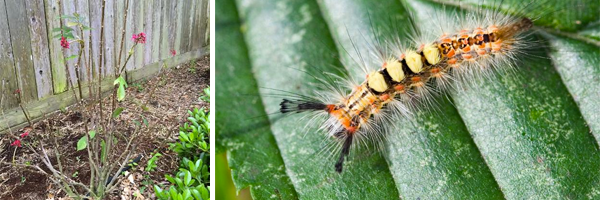 Aphids on Milkweed: If you plant tropical milkweed to help the monarch butterflies (and for the beautiful flowers) sooner or later you will get aphids. You can hose down the infested milkweed tips with a sharp stream of water, knocking most of the aphids off (away from your other plants please). But if you see a substantial number of aphids looking brown and bloated instead of just fat and sassy, you may choose to
leave them alone. The brown, bloated ones have been parasitized by a tiny braconid wasp, whose larvae will eat the insides of the aphid, metamorphose into a wasp, and hunt down scores of aphids to lay eggs on, continuing to destroy aphids with no supervision from you. -James

Too much rain on roots? My walking buddy sent me a photo of her unhappy Jatropha and wanted to know what the problem was. We believe the constant moisture over the last few months caused the roots to rot which caused the plant to drop foliage (a plant is programmed by mother nature to drop foliage if roots are suffering).
Now that the sun is out and soils are drying, we recommended she cut the plant back one half and be stingy with watering. Most likely it will flush with new spring foliage and be good to go.
-Sally

Caterpillar alert: I have had several customers bringing me Tussock Moth Caterpillar from their oak trees. The creamy white hairs on the caterpillar are long and bristle-like and spread out in tufts down the sides. Two long, sharp black pencil like hairs protrude near the front and rear and these hairs are connected to poison glands, which excrete venom on contact. Contact with the venom may result in itchy irritation. You can spray your tree with Hi Yield Thuricide Concentrate or Natural Guard Spinosad Hose-end. We also carry Spinosad in a concentrate Fertilome Borer, Bagworm, Tent Caterpillar and Leafminer Spray. Both of these products are organic and safe to use on all plants. Thuricide
 reacts with the cells of the stomach lining of the target pest causing them to not be able to feed within hours of ingesting. They eventually die from starvation. Spinosad is a contact kill, but still safe and organic for all plants. reacts with the cells of the stomach lining of the target pest causing them to not be able to feed within hours of ingesting. They eventually die from starvation. Spinosad is a contact kill, but still safe and organic for all plants.-DeAnna |

Posted in Problem Solving
Better than your average email.
The Gill Garden News
Sign up for the Gill Garden News, our weekly e-newsletter! Each Thursday at 6pm, you’ll receive the Garden News direct to your inbox, packed with a weekly gardening blog, garden tips, weekly in-store specials, updates about events, and lots more.




Reader Interactions